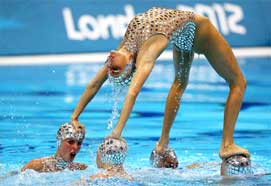 Personal finance skills are of utmost importance to those that train to compete in the Olympics. Gold is obviously the coveted prize at the end of the Olympics rainbow. But what some of the athletes do to earn their daily gold in between competitions shows a wide range of personal wealth — or poverty. On this year’s roster are a dentist, a bartender/bouncer, a former brothel owner and a monk, plus many with more mundane jobs, according to an Associated Press story.
Personal finance skills are of utmost importance to those that train to compete in the Olympics. Gold is obviously the coveted prize at the end of the Olympics rainbow. But what some of the athletes do to earn their daily gold in between competitions shows a wide range of personal wealth — or poverty. On this year’s roster are a dentist, a bartender/bouncer, a former brothel owner and a monk, plus many with more mundane jobs, according to an Associated Press story.
The costs of training are enormous, and the time demands of training mean that earning a living has to fit a flexible schedule. In some countries, the local International Olympics Committee provides some help. Not so in the United States. The International body shares some money with the smaller organizations, but the latter get to decide what to do with it. In some places, none of it trickles down to the Olympic hopefuls.
That means some athletes end up jockeying two or more jobs — up to seven in rate instances — to pay for their training and keep themselves fed.
Before coming to the London Games this summer, Irish boxer Darren O’Neill was a teacher at Holy Trinity Primary School in Dublin. He quit before the London competition to train full-time. Will he have a job to go home to? He isn’t sure, although a hand-painted banner on the school saying “Good Luck Mr. O’Neill” is a promising sign. Bottom line: He likes boxing well enough to sacrifice the job if necessary.
When Lance Brooks, an American discus thrower, moved to Denver to start serious training five years ago, he became a bartender/bouncer and all-around bar backer, restocking shelves and taking out the trash. He also picked up cash working Denver Rockies baseball games and coaching at a local high school. He did a stint at an oil-change service and worked construction to make ends meet. Finally, his coach put the kibosh on so many jobs. Brooks had to choose to discontinue his patchy employment or lose his trainer.
Some of the Olympians combine work and training. Luca Tesconi of Italy, who won silver in 10-meter air pistol competition, is a police officer in his home town. And Kai Johnssan, a pistol shooter, is a member of Finland’s Coast Guard Air Flight Patrol.
Sometimes they get creative. Nick Symmonds, four-time U.S. outdoor track champion in the 9000-meter, went on eBay and auctioned a spot on his shoulder for $11,100, promising to sport a temporary tattoo for the highest bidder. The offer was picked up by Hanson Dodge Creative, a marketer focused on active lifestyles. Too bad. Olympic rules preclude athletes advertising brands during competition. Symmonds had to cover his billboard shoulder.
Wendy Houvenaghel had to take continuing education courses so she could go back to her career as a dentist in Northern Ireland after taking an extended break for training. She’ll go back to dentistry when the Olympics and her cycling career are over. She rides for Britain.
At the extremes are Logan Campell, a taekwondo fighter for New Zealand, who financed his training with an upscale brothel in Aukland, and Kenki Sato, a Japanese equestrian competitor, who is a monk at his family’s Buddhist Temple near Nagano. Campbell sold the brothel in 2010 (although prostitution is legal in New Zealand) when the help was provided by his the IOC and sponsors. Sato will go back to his job as monk, which he says is good for discipline.
The 2012 Olympics will end and then dozens of this year’s athletes, along with hundreds of hopefuls for Olympics future will be back to the grindstone to earn the pennies that lead to the gold.

